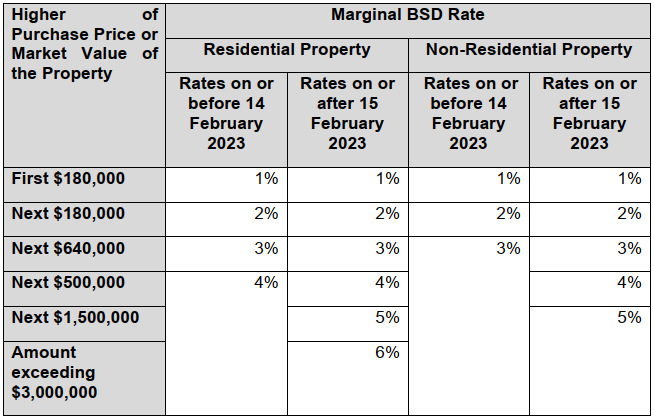The buyer's stamp duty (BSD) rate for both residential and non-residential properties will increase with effect from 15 February 2023.
For residential properties, the portion of the value in excess of S$1.5 million and up to S$3 million will be taxed at 5 per cent, up from the current rate of 4 per cent. The value of the property in excess of S$3 million will be taxed at 6 per cent.
The changes will apply to all properties acquired from Wednesday, and are expected to affect 15 per cent of homes, said Mr Lawrence Wong, Singapore Finance Minister.
For non-residential properties, the portion of the value in excess of S$1 million and up to S$1.5 million will be taxed at 4 per cent, while that in excess of S$1.5 million will be taxed at 5 per cent, up from the current rate of 3 per cent.
These changes are expected to affect 60 per cent of non-residential properties.
If the Option to Purchase (OTP) was granted to buyers on or before 14 February 2023, the current stamp duty rates shall apply provided that the OTP has to be exercised on or before 7 March 2023 or within the OTP validity period, whichever is earlier.
If the price for a 3-bedrooms condominium is S$2 million, the buyer would need to pay an additional S$5,000 of BSD to Inland Revenue Authority of Singapore (IRAS) under the new regime.
However a 4-bedrooms luxurious apartment in the Core Central Region (CCR) with a selling price of S$10 million, the difference in buyer stamp duty would be S$155,000.

With the reopening of China economy, foreign investors are expected to fly to Singapore and buy properties.
The Government does not discourage them from buying Singapore residential or commercial properties.
The increase in buyer's stamp duty (BSD) rate is expected to generate an additional S$500 million in revenue per year for the Government according to Mr Wong who is also Deputy Prime Minister (DPM).
The lower income group will stand to benefit indirectly as the more well-to-do pay more taxes as a result.

